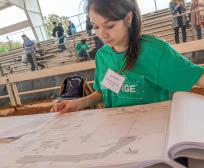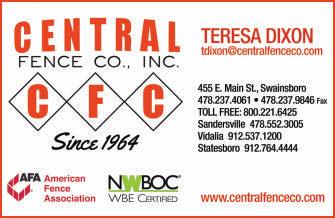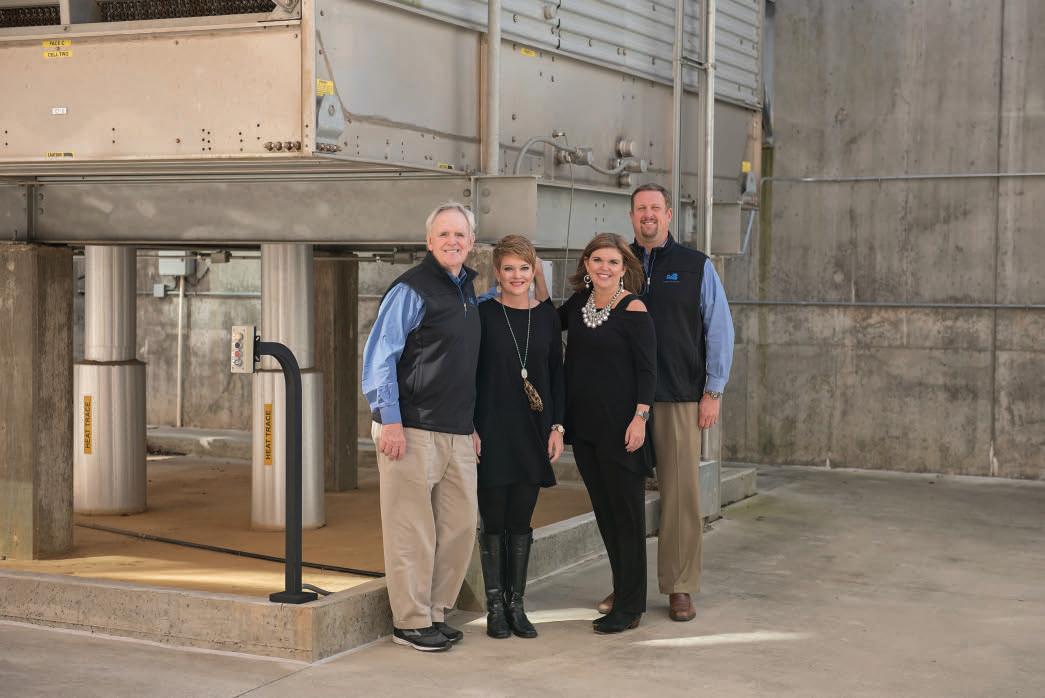
































The increase in demand for talented workers in the construction industry continues to grow year after year. AGC Georgia has made it their mission to help fuel this pipeline with young, gifted, and motivated individuals.

12 Protecting Confidential Financial Data from Disclosure Under the Georgia Open Records Act

8 State’s New Private Permitting and Inspection Law Stakeholders felt


construction industry needed a viable option for plan review and inspection services when local governments either can’t or won’t provide timely service.
Contractors should be mindful of not only their rights and but also their responsibilities.
13 Local Students Earn AGC of America College
These talented students will join our current workforce and be the next generation of industry leaders.
15 Five Advisors Contractors MUST Have

Trusted advisors are needed all the time. When you have a specialized need, reach out to find the right people to get answers.
Publisher: Heather Greyling
Editor: Rachael Ryals
Project Manager: Adam Lingenfelter
Publication Director: Ryan Griffin
Advertising Sales: Bill Lovett, Stephanie Musial, Christian Naja, Marjorie Pedrick, Christine Ricci, Vicki Sherman, Raymond Strickland
Project Coordinator: Cindy Samons
Layout & Design: Pankaj Kumar Bharti
©2019 Naylor, LLC. All rights reserved. The contents of this publication may not be reproduced by any means, in whole or in part, without the prior written consent of the publisher.
PUBLISHED SEPTEMBER 2019/ GGC-B0219/5432
COVER: ROB WILSON/SHUTTERSTOCK.COM





s a third-generation leader of a family-owned construction company, I’ve been immersed in the business my entire life and have witnessed first-hand, the important role AGC Georgia plays in the success of our industry. I am an avid believer of investing in the future of construction and building opportunities that will create a positive climate for our work. I am honored to support these initiatives and continue to partner with you all while serving as president.
As we all know, it’s critical for our association to keep workforce development at the forefront. Our continued efforts with key stakeholders from the legislature, DOE, TCSG, our membership, and so many others, are paying off. These initiatives are consistently gaining more traction. While supporting those initiatives, I also look forward to adding a specific focus on apprenticeships and technical college enrollment. Apprenticeships are nothing new. We are all familiar with these programs for skilled trades like carpentry, mechanical or electrical workers. I’m excited about my firm’s efforts to develop a first-in-the-nation program designed to develop project superintendents. I am confident this program can be replicated, thus helping all regions of our state grow field leaders to fill the gap left by our aging workforce.
I do think it’s important for contractors to realize we are asking the technical colleges to help our businesses by training our workforce. In saying that, I believe we’re going to have to help their business as well. Construction-focused curriculum cannot exist without enrollment, and this is where AGC Georgia is best positioned to serve as an advocate. Starting an apprenticeship or enrolling one of your people in technical college will not solve our state’s workforce issues, but it’s an important piece of the puzzle. If we are all taking proactive steps, we are moving the needle in the right direction.
Another passion of mine, and where I hope to spend some time during my year as president, is with the
Brian Daniel President & CEO Carroll Daniel Construction 2019-2020 President AGC Georgia

AGC Georgia Foundation. I have thoroughly enjoyed my time on many charitable boards over the years, and I believe groups like ours have the power to do great things through foundations. Our 501(c)(3) tax-exempt entity has the potential to grow and really make a mark on our industry by funding even more charitable giving and construction education. I will work with our board leadership and our membership to boost this investment in our future so it can become an even more valuable tool with a larger voice for many years to come.
I ascend to this leadership position at a great time for the organization. Our membership numbers are strong and growing daily; our financial position is stronger than at any point in our history; our education programs allow our members to invest in their people; our Young Leadership Program is nationally-recognized as best in class; our new Executive Alliance is receiving incredible feedback; and our influence at the Capitol is unmatched – all key to helping make us The Construction Association in Georgia!
AGC Georgia is an invaluable resource to member construction firms, and I am grateful to have the opportunity to continue the legacy and serve this great association.
Starting an apprenticeship or enrolling one of your people in technical college will not solve our state’s workforce issues, but it’s an important piece of the puzzle. If we are all taking proactive steps, we are moving the needle in the right direction.

Earlier this year, HB 493 amended Georgia Code regarding Private Plan Review and Inspections, creating a new law, known and cited as the Private Permitting Review and Inspection Act
AGC Georgia and the American Council of Engineering Companies (ACEC) Georgia worked with the Association County Commissioners of Georgia (ACCG) and the Georgia Municipal Association (GMA) on this legislation for several years. We are grateful for the support of many others including our primary bill sponsors, Representative Kevin Tanner and Senator Mike Dugan.
Stakeholders felt the construction industry needed a viable option for plan review and inspection services
when local governments either can’t or won’t provide timely service. HB 493 changes the statutory time frame for local government private plan review from 30 business days (6 weeks) to 30 days (4 weeks). HB 493 also changes the statutory fee structure collected when a governmental entity does not provide the plan review or inspection services.
Under prior law, the governmental entity collected 100 percent of the fee, even though they are not providing the plan review or inspection services. HB 493 amends this fee structure, allowing the governmental entity to collect only 50 percent of the normal fee, if they cannot provide plan review within 30 days.
HB 493 requires local governments, which impose regulatory fees or requirements, to establish and make available a list of all fees/ requirements and all the documentation required of an applicant to have a complete application. The local government has 5 business days after receipt to notify the applicant whether an application is complete.
Once the application is determined to be complete, the local government must inform the applicant whether the construction plan review can be completed within 30 days (this includes the 5 business days to determine application completeness) for plan review, or within 2 business days for inspection, after receiving a valid written request for inspection.

House Bill 31: Another key issue for AGC Georgia during this session was to get more funding for construction-related workforce development needs in the 2020 Georgia budget. We successfully lobbied for $500,000 for capital equipment needs in high school construction classrooms and another $220,000 to help fund CTAE construction teacher “Extended Day” stipends in the 2020 State Budget. CTAE teachers are critical to helping students within our schools' work-based learning programs. These funds were part of the 2020 State Appropriations Budget bill.
House Bill 186: A bill focusing on Certificate of Need was signed in to law with an effective date of July 1, 2019. Certificate of Need is an endorsement required by Georgia, and numerous other states, before approval of construction for new health-care facilities can take place. The bill’s original language was amended to include the final compromise provisions:
• Raising the capital expenditure requirement threshold from $2.5 million to $10 million and allowing “destination cancer hospitals” to apply to be a “general cancer hospital,” which would change the requirements for in-state and out-of-state patient numbers.
• Updates provisions in the Rural Hospital Organization Tax Credit regarding annual reporting and ranking hospitals in order of financial need.
• Establishes the Office of Health Strategy and Coordination to help state officials and experts to share information and develop innovative approaches to accessible care.
Senate Bill 131: This bill sought to give the state authority over Georgia’s “major airports,” which is any airport used for public commercial aviation and conducts more than 400,000 takeoffs and landings in a calendar year. The bill passed the Senate and House Rules amended it late in the session to create an oversight committee rather than plan a “takeover.” The House amendment also would have applied to more major airports in Georgia not having thresholds that only apply to HJAIA. An agreement wasn’t reached in the final hours of the session by the House and Senate on the amended bill. Instead, it is teed up for consideration during the 2020 session and could have impact on how companies do business with airports.
If the local government determines they cannot provide the regulatory functions within the new time frames, the applicant may then retain, at its own expense, a private provider to perform the plan review or inspection services. The local government regulatory fees will be reduced by 50 percent . The private provider cannot be an employee of, or otherwise affiliated with the business engaged in the construction project to be reviewed or inspected.
HB 493 also contains language allowing permit and inspection applicants of a project to immediately contract with licensed professional engineers or architects to conduct a plan review or inspection without having to wait on the governing
authority, even if the government entity can provide the service within the 30-day time frame. Under this provision the applicant is obligated to pay a 100 percent convenience fee to the governmental entity.

• Allows local governments to pre-qualify companies that choose to provide permit reviews. (Prequalifications must be related to Plan Review and Inspections);
• Requires a local government finding a deficiency in a permit review to provide a written notice of the deficiency within 30 days to allow the private plan review professional to either correct the deficiency or dispute it;
• Requires a local government finding a deficiency in any inspection to provide a written notice of the deficiency within 2 days to allow the private plan review professional to either correct the deficiency or dispute it;
• Retains the ability of local governments to issue stop-work orders (when problems arise – such as life safety issues); and
• Keeps the granting of a certificate of occupancy with the local government, not the private provider. Participants involved in passing this bill, from both the private sector and local government, hope to begin working together over the next few months to develop industry best practices for implementation of this new law. ■
It’s no secret that workforce development remains one of the construction industry’s top priorities. That’s why AGC Georgia is proud to work again with contractors from across the state to host Georgia high school construction students at the 2019 regional Skills Challenges.


Last year, these events hosted busi ness leaders, school board members, administrators and counselors, along with local politicians and media. It was a great opportunity for these influ encers to experience first-hand the excitement the student competitors have for the construction industry.
For 2019, AGC Georgia is proud to announce we are growing the Challenges from four to five regional events. This will make it easier for more schools to participate now that the Challenges are gaining quite a loyal following.
“The Skills Challenges are an important initiative that positively impact the industry,” said Mike Dunham, CEO of AGC Georgia. “It’s been rewarding to see the events grow in stature and size every year, because it’s critical for our industry to continue finding ways to encourage students to consider a career path in construction.”
The increase in demand for talented workers in the construction industry continues to grow year after year. AGC Georgia has made it their

Last Year’s Totals
65 Competing Schools
607 Student Competitors
1,100 Student Observers
$128,451 Contributions
165 Sponsoring Firms
LOCATIONS
2019 Locations:
• Macon on Oct. 31
• Gainesville on Nov. 7
• Moultrie on Nov. 12
• Augusta on Nov. 14
• Cedartown on Nov. 19
Dedicated support from our partner firms is critical to hosting successful Skills Challenges. Thank you to the following firms for their commitment to building the next generation of industry talent.
Partners for Upcoming Challenges:
• Ace Electric, Inc.
• R. W. Allen Construction
• Bowen & Watson, Inc.
• Brasfield & Gorrie
• Carroll Daniel Construction Co.
• Duffey Southeast, Inc.
• Gold Mech, Inc.
• JCI Contractors
• Sheridan Construction
• Swofford Construction, Inc.
mission to help fuel this pipeline with young, gifted, and motivated individuals.
Competitions are held in the following skill categories (depending on location): blueprint reading, cabinet making, carpentry, electrical, HVAC, masonry, plumbing, roofing, TeamWorks and welding.


The five Skills Challenges help prepare the students for competition in their respective regional SkillsUSA events in January and February of 2020. Winners of those regional events participate in the Georgia SkillsUSA competitions at the Georgia World Congress Center in March 2020.

Regional planning meetings will be held leading up to the November 2019 events. To learn more about how to get involved in these rewarding events, please contact Bill Chambless at 478-972-5865 or chambless@agcga.org or contact Liz Campbell at 470-702-1348 or campbell@agcga.org. ■

a contractor wants to try to prevent a public agency’s disclosure of that information in response to an Open Records Act request, the contractor must act to protect that information.
By Douglas L. Tabeling Smith, Currie & Hancock LLP
Public owners at times require contractors to submit financial statements or other sensitive financial data or proprietary information as part of the contractors’ responses to requests for qualifications, requests for proposals or invitations for bids. When financial or proprietary information is submitted to a state or local government agency in Georgia, that information becomes subject to Georgia’s Open Records Act. Georgia law does not treat a contractor’s financial data as confidential by default. If
The Georgia Open Records Act requires a contractor who wants to protect sensitive financial data from public disclosure to attach to those documents an affidavit specifically identifying that information and declaring the information is a “trade secret” as defined by section 10-1-761 of the Georgia Code. If the affidavit is not submitted at the same time as the financial information, then the public agency can release the financial records without notifying the contractor. In some cases a public owner might warn the contractor about the pending possible disclosure and allow, or even ask, the contractor to submit a later affidavit that the agency might be willing to rely, but the owner is under no obligation to do so.

If a contractor attaches an affidavit meeting the statutory requirements, then, before producing the identified financial records in response to an Open Records Act request, the public owner must notify the contractor of the owner’s intention to disclose that financial information unless the owner is prohibited from doing so by an appropriate court order. If the contractor wants to prevent disclosure of the requested records in that event, the company can file an action in state court seeking a protective order exempting the requested records from disclosure. If the affidavit is provided, however, it increases the likelihood that the public owner will determine
that the specifically identified information is indeed a trade secret and will withhold the records from disclosure. If the affidavit is provided and the public owner determines that the information is a trade secret, then a requester intent on obtaining the documents would have to file an action in court seeking an order setting aside the agency’s determination and stating that the requested records are subject to disclosure.
A contractor’s duty to act to protect its financial information from release varies from state to state. In some states, no action is required in certain circumstances, as the law presumes the confidentiality of that information and exempts it from disclosure. Florida’s Public Records Law, for example, exempts “any financial statement that an agency requires a prospective bidder to submit in order to prequalify for bidding or for responding to a proposal for a road or any other public works project.” But contractors should not presume that every state’s public-records laws will treat contractors’ financial data the same way. Contractors wanting to protect confidential financial information submitted to a public entity during the course of pursuing a public contract should be mindful of not only their rights and but also their responsibilities. ■
Congratulations to three Kennesaw State University construction students for earning a minimum of a $2,500 college scholarship from the AGC of America Education and Research Foundation. It's an honor to recognize these individuals and encourage all students enrolled in CM programs throughout Georgia to apply for a 2020 scholarship. It’s exciting to know these students will join our current workforce and be the next generation of industry leaders.

Kennesaw State University
Construction Management major AGC Student Chapter member

construction crews and continue to set high standards of excellence in the construction industry.
Kennesaw State University
Construction Management major
Joseph has always been fascinated by transportation projects, such as roads and bridges, and being on a construction site. Building new construction or making improvements to existing infrastructure encourages him because it improves the quality of life for the local community. He seeks exciting challenges, working with others and new learning opportunities every day. Hoping to excel as a successful project superintendent, he wishes to lead
Misikir has more than 20 years of experience in the construction industry with extensive urban infrastructure and managing large, complex multi-use development projects. He graduated with an associate degree in Civil Engineering in 1996 and began his career at Dessie Town Municipality in Ethiopia as a building engineer. After graduating from Urban Planning and Engineering with honors in 2005, his second job was an assistance lecturer for three years at a university in Ethiopia.
In 2008, he founded Misikir Shiferaw General Contractor construction company. As a general manager of the company, he managed and ensured all projects were completed on time and within budget. The firm successfully completed one health center and six, 5-story condominium housing buildings in Ethiopia.

These students will join our current workforce and be the next generation of industry leaders.
In 2010, Misikir moved to the United States with his family. He is currently working as a construction inspector supervisor in Capital Project Division and expected to graduate with a Masters of Science in the Construction Management program at Kennesaw State Univer sity in May 2020.


Kennesaw State University



Civil Engineering major, Construction Management minor, and Land Surveying Certificate AGC Student Chapter member


Addie is a fourth-year student and serves as the marketing officer for the AGC Student Chapter. She is also a young constructor member within AGC Georgia's Young Leadership Program (YLP). With her passion for leadership and design, Addie enjoys facilitating group projects and matching her team members with tasks that best fit their expertise. Her post-secondary education, combined with her networking and hands-on experiences, has allowed Addie to gain the confidence to pursue a career as a project manager. ■

 By Wayne Rivers Co-Founder and President The Family Business Institute, Inc.
By Wayne Rivers Co-Founder and President The Family Business Institute, Inc.

To be successful in business over long periods of time, you must find talent. Just as you work to find the best employees, you must invest time and effort into finding the right advisors who understand your vision and goals for your business.
I recommend five different advisors for top construction companies.
Number one is a certified public accountant . Without question, you must file taxes and comply with various levels of regulations government requires.
The second is an attorney. And, in today’s world, this really means multiple attorneys. The days of Perry Mason solving all your unique legal concerns have passed. There is so much specialization within the law now, such as construction law, estate planning, business law, etc., you need a full-service law firm. They're all quite different and a nice-sized law firm will have experts in each of these areas who can help you.
Third, you will also need a trusted banker
It’s also important to have adequate insurance coverage so you need an insurance agent as your fourth advisor. Insurance can be quite complex; you need a great surety agent, property and casualty coverage, life insurance, etc. Shop for the top pros in your area, and check with your brother and sister contractors for references.
And, for the final advisor, as you reap the benefits of your hard work and enjoy success over time, you will need someone to handle your investments . This person
can work with you not only on your own investments but also help create a path for continued financial stability for the business.
So, who's not in my top five? Consultants.
You don't need consultants all the time. They are better for short-term needs on specialized projects, such as IT or succession planning. Those are unique needs that only arise occasionally.
The second area where you might need an outside consultant is simply to help find answers that aren’t in the wheelhouse of the traditional five advisors. They can be excellent resources when you need a new, fresh way of looking at things or a deeper analysis of a problem and outside alternatives to resolve it.
Another area where an outside consultant could help is when you are ready to dive into true long-term planning. These professionals can help with financial and performance benchmarking against the industry, so you can focus on your margins or the productivity of your employees or your gross revenue per employee. This information helps you know if you're being effective, efficient and profitable.
Consultants who specialize in long-term planning are also great at helping identify potential HR needs, hone
in on services that your firm can offer as markets evolve and which geographies you’ll serve as time passes.


While always a sensitive discussion, a consultant can also help deal with unproductive team members, even if they are family members. It is often helpful to have an outside third-party help evaluate these matters.
It’s also critical for a business to be thoughtful in grooming its next generation of company leaders. All firms, including family-owned ones, need a clear understanding of who will take the helm. Consultants can help set this path, especially when current leadership feels that several can grow into top executives.

Every generation or so, businesses must decide, “Are we going to keep this in the family or are we going to open it up and sell to outsiders?” Whether the buyer happens to be current employees or from outside the company, this decision is fraught with emotion. You can’t make this decision lightly and there is no room for knee-jerk reactions.
My experience shows that in today’s business climate, people are much more interested in meritocracy and evaluating fair alternatives for not just family members but also for long-term, valued, key employees. Also, decisions today are more complex today than they used to be.
It's important to understand one key difference between the trusted advisors and a consultant. On average, a good consultant will work themselves out of a job in three to nine months, thus you only need them occasionally. Your trusted advisors are needed all the time. When you have a specialized need, reach out to find the right people to get answers.
But, your five key advisors, keep them on board and close all the time.
Your trusted advisors are needed all the time. When you have a specialized need, reach out to find the right people to get answers.


Conditioned Air Systems (CAS) is a family-owned and operated business that has served north Georgia as the most reliable HVAC source for over 35 years. It is our honor that CAS customers across North Georgia have trusted us as their single source to design, build, install and maintain quality HVAC systems.

Our service areas include: Residential | Commercial | Industrial | Installation Service | Planned Maintenance Agreements
770-536-7509 | conditionedairsystems.com 2410 Hilton Way, SW | Gainesville, GA 30501

